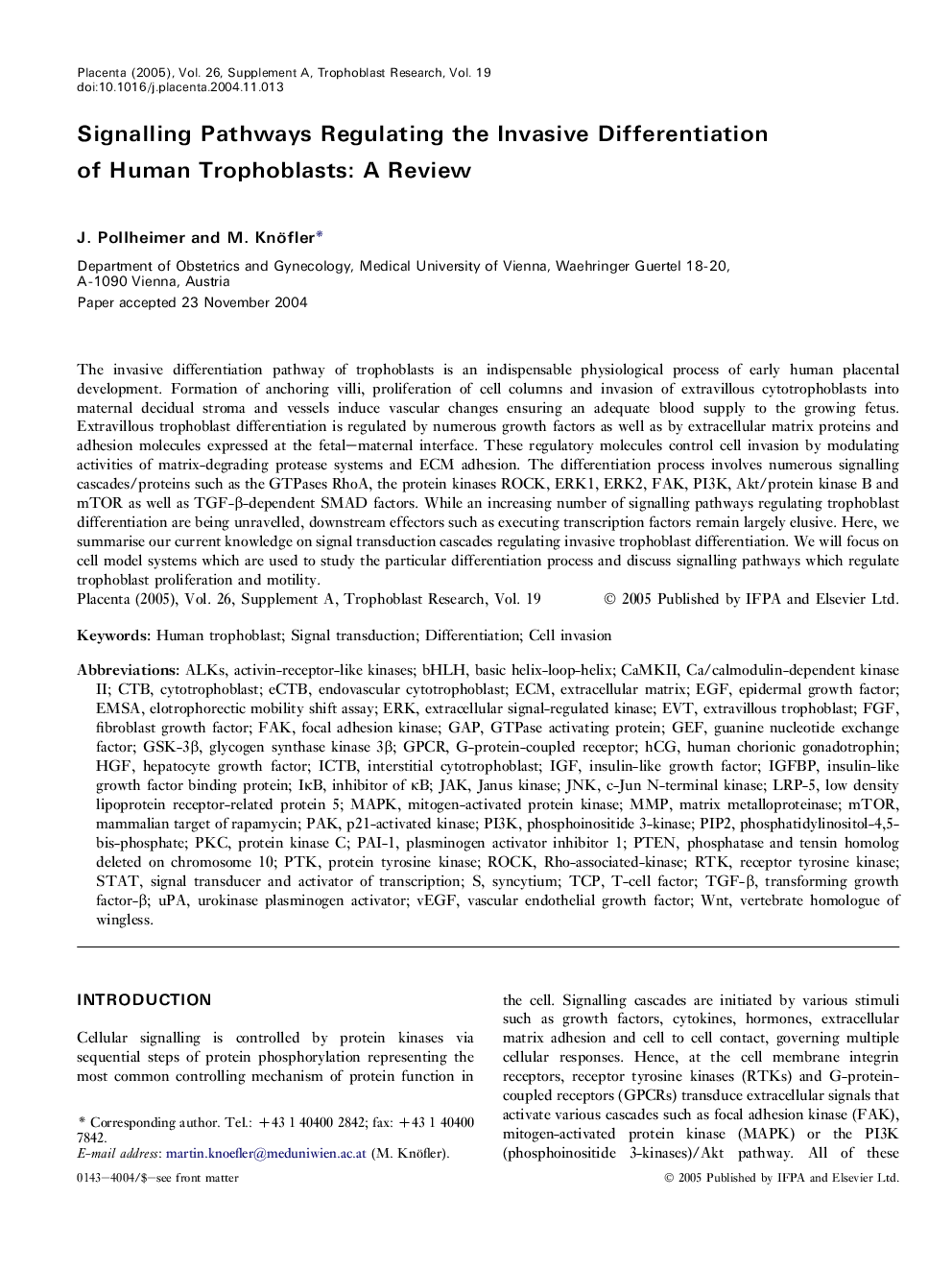| Article ID | Journal | Published Year | Pages | File Type |
|---|---|---|---|---|
| 9109500 | Placenta | 2005 | 10 Pages |
Abstract
The invasive differentiation pathway of trophoblasts is an indispensable physiological process of early human placental development. Formation of anchoring villi, proliferation of cell columns and invasion of extravillous cytotrophoblasts into maternal decidual stroma and vessels induce vascular changes ensuring an adequate blood supply to the growing fetus. Extravillous trophoblast differentiation is regulated by numerous growth factors as well as by extracellular matrix proteins and adhesion molecules expressed at the fetal-maternal interface. These regulatory molecules control cell invasion by modulating activities of matrix-degrading protease systems and ECM adhesion. The differentiation process involves numerous signalling cascades/proteins such as the GTPases RhoA, the protein kinases ROCK, ERK1, ERK2, FAK, PI3K, Akt/protein kinase B and mTOR as well as TGF-β-dependent SMAD factors. While an increasing number of signalling pathways regulating trophoblast differentiation are being unravelled, downstream effectors such as executing transcription factors remain largely elusive. Here, we summarise our current knowledge on signal transduction cascades regulating invasive trophoblast differentiation. We will focus on cell model systems which are used to study the particular differentiation process and discuss signalling pathways which regulate trophoblast proliferation and motility.
Keywords
PAI-1FGFERKCaMKIIIκBEVTGSK-3βGPCRPKCPAKWntbHLHHGFuPAGEFRTKIGFBPPIP2SyncytiumPTKTGF-βEMSAFAKECMPI3KMMPEGFIGFJnkCTBmTORJanus kinasec-Jun N-terminal kinaseG-protein-coupled receptorGTPase Activating ProteinMAPKSTATbasic helix-loop-helixHCGtransforming growth factor-βHuman trophoblastextravillous trophoblastDifferentiationCell invasionCytotrophoblastGAPT-cell factorepidermal growth factorHepatocyte growth factorguanine nucleotide exchange factorVascular endothelial growth factorVascular Endothelial Growth Factor (VEGF)fibroblast growth factorInsulin-like growth factorphosphatase and tensin homolog deleted on chromosome 10phosphoinositide 3-kinaseurokinase plasminogen activatorTCPExtracellular matrixmatrix metalloproteinaseSignal transducer and activator of transcriptioninhibitor of κBplasminogen activator inhibitor 1Signal transductionmammalian target of rapamycininsulin-like growth factor binding proteinProtein tyrosine kinaseProtein kinase Cmitogen-activated protein kinaseJAKPtenextracellular signal-regulated kinasep21-activated kinasefocal adhesion kinaseGlycogen synthase kinase 3βhuman chorionic gonadotrophinReceptor Tyrosine KinaseRock
Related Topics
Life Sciences
Biochemistry, Genetics and Molecular Biology
Developmental Biology
Authors
J. Pollheimer, M. Knöfler,
